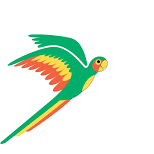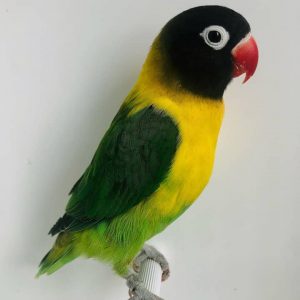Description
Peach faced lovebird for sale, are one of three lovebird species that are very popular, affectionate, and readily available. The others are the Masked Lovebird and the Fischer’s Lovebird varieties.
If you obtain a hand-raised Peach-faced Lovebird you will have an incredibly affectionate friend. It is a most playful, intelligent, and amusing little bird. This small parrot is also an excellent beginners bird,being relatively hardy, easy to care for, a willing breeder, and reasonably priced.
The Peach-faced Lovebirds are very social and love companionship. Their natural behavior is to live closely with a companion so are often kept with another lovebird. Though they make a very fine and affectionate pet when hand-raised, they will need a lot of attention if kept singly. Most are kept in pairs to satisfy their considerable need for constant companionship, mutual preening, and socialization.
Social Behaviors Peach faced lovebird
Lovebirds are very social birds. Generally and in most situations, it is thought to be essential for their good health and happiness that they be kept in pairs, not singly. If keeping a single lovebird, you must provide the necessary social interaction that it is missing from another bird. These birds develop fierce loyalties to their keeper or their mate.
Aside from their social nature toward you or their mate, lovebirds can be extremely aggressive towards other birds. You must be certain that all pairs get along together, and that they are true “pairs”, not mismatched. Bonded pairs constantly groom each other and will feed each other from the crop during breeding season and all year round. These little birds will chatter all day long.
Another aspect of this parrot’s behavior is the strong bond they form with whoever they consider their mate. This may be another lovebird or a human companion. Jealously toward others may become an issue. They can become depressed after the loss of a mate. Socialization with multiple humans can minimize the problem, but they can become one-person birds.
Peach Faced Lovebirds require daily interaction with their chosen mates to maintain their mental well-being. Lack of proper mental and physical stimulation can cause your parrot to resort to feather plucking.
Lovebirds are intelligent and can learn a variety of skills. They are not good talkers, but they compensate by being intelligent in other areas. Cages with sliding doors are a piece of cake for these birds, and once they figure it out, the only way to keep them in their cages is with a lock. Daily involvement is essential to tame these birds, and it may take some time to reestablish your relationship with your parrot after extended periods of inattention.
Handling/Training
Lovebird training is best accomplished with a young bird. To have a tame lovebird, its also best to work with a single bird. Young birds have an amazing ability to learn tricks and be affectionate. Adults on the other hand, are very difficult to tame and generally won’t learn a lot of tricks or imitate behaviors. Hand-raised youngsters are easiest to work with. They are already quite socialized and tame, but unfortunately they are not always available.
Taming involves acceptance and trust between you and your bird. It means spending a lot of time with your bird daily. Start with talking softly and making slow movements. Once your bird is comfortable with you, then you can begin hand-taming. Use a dowel and push it gently against the birds chest while offering a treat to coax it up onto the dowel. This may take many tries. Once it is comfortable with stepping up onto a dowel, substitute your finger for the dowel.
Care and feeding
Bird Food
Foods available for Lovebirds include formulated diets, either pelleted or extruded, seed only diets, and small parrot mixes which offer a mixture of both. There are pros and cons to feeding only a formulated diet as well as feeding only a seed diet.
Formulated Diet:
A formulated diet provides a good nutritional base so does not require the addition of vitamins. However it does not contain the phytonutrients (antioxidant pigments) that are found in vegetables, fruits, grains, and seeds. Parrots can become bored with formulated diet due to the lack of variety.
Seed Diet:
A seed only diet offers much more variety but requires additional vitamin and calcium supplements. Lovebirds need not only nutritional requirements met but also variety for psychological enrichment.
A lovebirds diet will consist of 1 1/2 to 2 ounces (45-60 grams) of feed daily for a single bird. Also a formulated diet along with greens, fruits, and vegetable supplements but without additional vitamins is also regarded as suitable, and is a more current trend.
Speech and Vocalizations
The shrill call of the Peach-Faced Lovebird is well-known. It might be made up of single notes or repeated tones. When you’re aroused or upset, the repetitions tend to speed up.
Peach-Faces are a chatty bunch.
When it comes to pets, they may be quite loud when they want to be, thus they are not suited for everyone.
Lovebirds aren’t particularly good talkers, and they rarely imitate human sounds. Your bird may be able to mimic a few words if persistently trained from a young age.
As a Peach-Faced lovebird owner, you may expect to hear singing, whistling, and chattering all day.
Breeding/Reproduction of Peach faced lovebird
Peach faced lovebird (for sale) is excellent for the beginning breeder. These birds will breed as either single pairs or in colonies, but they are much more prone to fighting in a colony setting so must be given plenty of space and more nest boxes than there are pairs of birds. In the wild these birds nest in crevices of cliffs or buildings, or take over the communal nests of weavers. When you provide them with a nest box, be sure to also provide lots of willow twigs, palm fronds, or other nesting materials as they will build a small nest of their own inside of the nest box. The female will carry the nesting materials between her back and rump feathers.
The hen will lay four to five eggs which are incubated for about 23 days. The young fledge (leave the nest) in about 30 to 38 days but will still be dependent until about 43 days. When they become independent, remove the young to their own housing.
Temperament
Peach-Faced lovebirds are very friendly birds that love to be around people. Their spritely personalities can make them quite entertaining to be around. To ensure your bird is tame, daily interaction is essential. They are not good talkers but are very intelligent and can be taught a variety of tricks.
These birds form strong bonds with whoever they consider their mate. This could be their human companion or another lovebird. They tend to become jealous if their mate gets attention from others.



Reviews
There are no reviews yet.